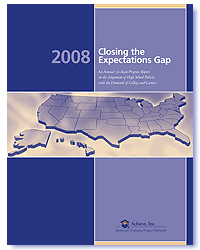All students should graduate from high school ready for college, careers, and citizenship.

NEWS RELEASE
CONTACT:
Matt Maurer, (202) 955-9450 ext. 322, mmaurer@communicationworks.com
Sandy Boyd, Achieve, (202) 419-1540, sboyd@achieve.org
WASHINGTON—February 20, 2008— While a majority of states have committed to raise expectations for high school students, more than one-third have already adopted college- and career-ready standards and graduation requirements, according to a report from the Washington, D.C.-based Achieve, Inc.
According to the third annual report from Achieve, Closing the Expectations Gap 2008, states have made the most progress in aligning academic standards and raising graduation requirements, but have moved more slowly on putting complementary tests, data, and accountability systems into place.
“Its clear that states are leading the way in ensuring that students leave high school with the knowledge and skills they need to be successful in college and careers,” said Michael Cohen, president of Achieve. “For states this is not just an academic exercise, it’s about preparing students for the global economy and the demands of citizenship in an increasingly complex world.”
Currently, 18 states and the District of Columbia now require students to complete a college and career-ready curriculum in order to earn a diploma, including four years of challenging mathematics through at least Algebra II and four years of rigorous English, and 12 states are expected to follow suit. Just three years ago, only two states had such requirements in place.
In addition to raising graduation requirements, states have also achieved significant progress in making academic standards rigorous enough in English and mathematics so that they reflect the expectations of colleges and employers. Nineteen states now report that their high school standards are aligned with college and workplace expectations, and 26 more are in the process of aligning standards or plan to do so.
In comparison, far fewer states have developed college and career-ready testing systems or moved to hold high schools accountable for the readiness of their students. Additional findings from the report include the following:
- Testing: nine states now administer college readiness tests to all high school students, while 23 others plan to do so.
- Accountability: four states now hold high schools accountable for the college readiness of their graduates and offer incentives for improving college-ready graduation rates, while seven more are planning to do so.
- Data Systems: eight states now have longitudinal data systems that can track students from pre-K through college graduation, while 39 states have plans to develop such systems.
“The pace and the progress of high school reform efforts are encouraging,” said Matthew Gandal, executive vice president of Achieve, “but no state has done everything that is necessary to close the gap between what is required of students in high school and what will be expected of them after they graduate. Higher standards must be accompanied by better assessments and next generation accountability systems if we are to realize the goal of all students graduating college and career ready.”
The report comes three years after 45 of the nation’s governors joined leaders from education and business to make high school reform a national priority at the 2005 National Education Summit on High Schools. Acknowledging that too few high school students graduate prepared for college and 21st-century jobs, governors at the Summit committed to dramatic state action to raise high school expectations and achievement in order to help ensure the nation’s competitive position in the global economy.
Since the Summit, 32 states have joined the American Diploma Project (ADP) Network, a coalition of states committed to preparing all students for college and work. Collectively, the ADP Network states educate nearly 75 percent of all U.S. public school students. Achieve provides policy leadership, and support to the ADP Network states, who announced in 2007 the development of a common Algebra II end-of-course test that will be used across some of the states that are part of the Network.
Created by the nation’s governors and business leaders, Achieve, Inc, is a bipartisan, non-profit organization that helps states raise academic standards, improve assessments and strengthen accountability to prepare all young people for postsecondary education, work and citizenship. Achieve was founded at the 1996 National Education Summit and has sponsored subsequent Summits in 1999, 2001 and 2005. At the 2005 Summit, Achieve launched the American Diploma Project Network, a coalition of 32 states committed to aligning high school expectations with the demands of college and the workplace. For more information, please visit www.achieve.org.

